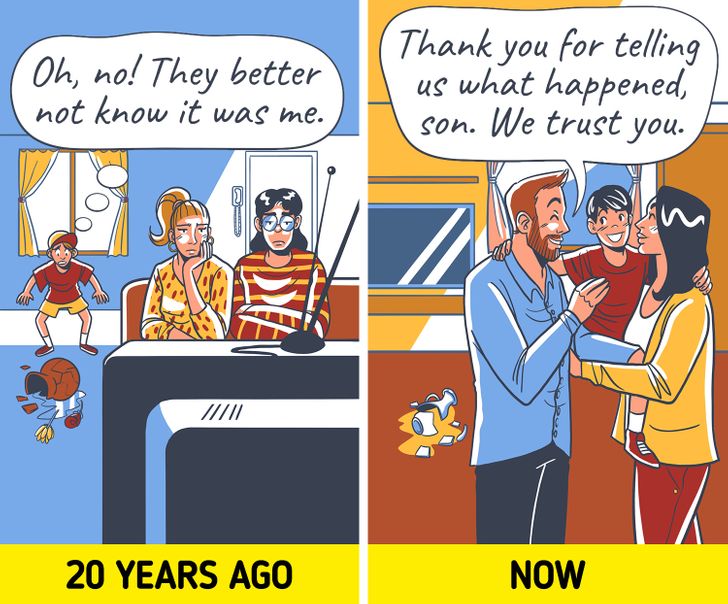Why Modern Parents No Longer Believe in Rewards and Punishment to Educate Their Children
Parenting has never been easy. There have been no magic formulas, then or now, for raising children. Every day, parents face unimaginable challenges. In fact, raising children involves raising yourself even more. When a child gets out of control, adults are forced to take action, but more often than not, they don’t quite know what to do. However, experts say it’s detrimental to educate using punishment and rewards.
Bright Side would like to talk about why education based on rewards and punishment could be considered a thing of the past and what the benefits of positive education are for children to grow up to be better adults.
Rewards and punishment are out of fashion.
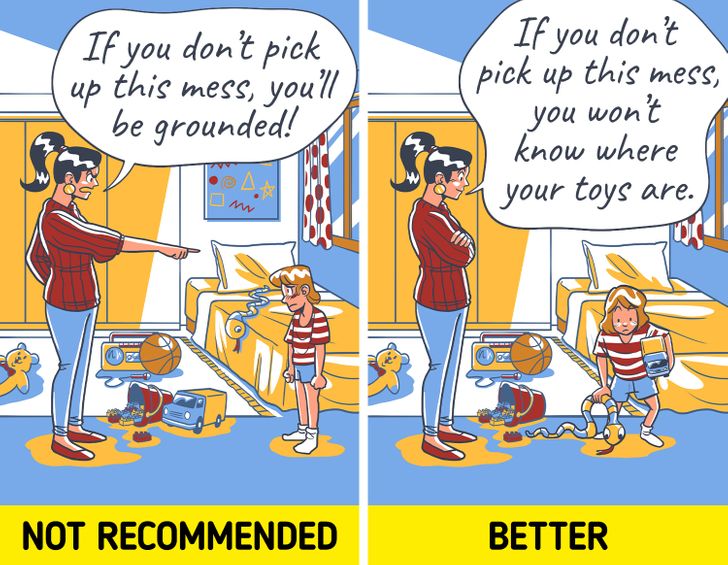
The good old “Eat all your veggies or there won’t be any dessert for you,” seemed to be a common rule in all households until a couple of decades ago. At first glance, rewards and punishment seem like 2 completely different concepts, but they are actually 2 sides of the same coin. Both are just an external impulse that focuses on the child’s behavior and tends to have an immediate effect, in which most people only see the main result (obedience) without realizing the long-term negative impact on personality development.
Thankfully, according to a study, even if such a manipulative attitude toward children was indeed the norm for a long time, the awareness of little ones’ educations has increased very slowly over the years. Parents nowadays tend not to use these types of techniques to bring up their children, and that includes the little classic dessert phrase mentioned above.
The side effects no parent wants
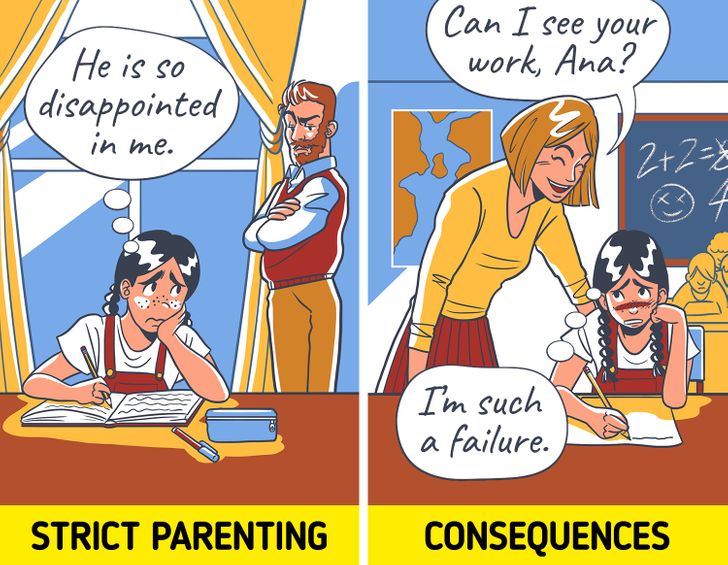
Dr. Angela Nakab, a specialist in pediatrics and adolescence and member of the Argentine Society of Pediatrics (SAP), said in a study that the child’s personality is formed through the bond with their parents and the environment (school, extended family, friends, etc.). Therefore, punishment is not ideal as a way of upbringing because instead of facing problematic situations in a correct way, what happens is that the idea of subjugation is strengthened in children, causing the following:
- Bad behaviors do not change.
- The child experiences anxiety for not knowing what is wrong.
- Low self-esteem problems are generated.
- Negative ideas are reinforced instead of positive ones.
- There is an erosion in the relationship between children and parents.
Positive education as a base for everything
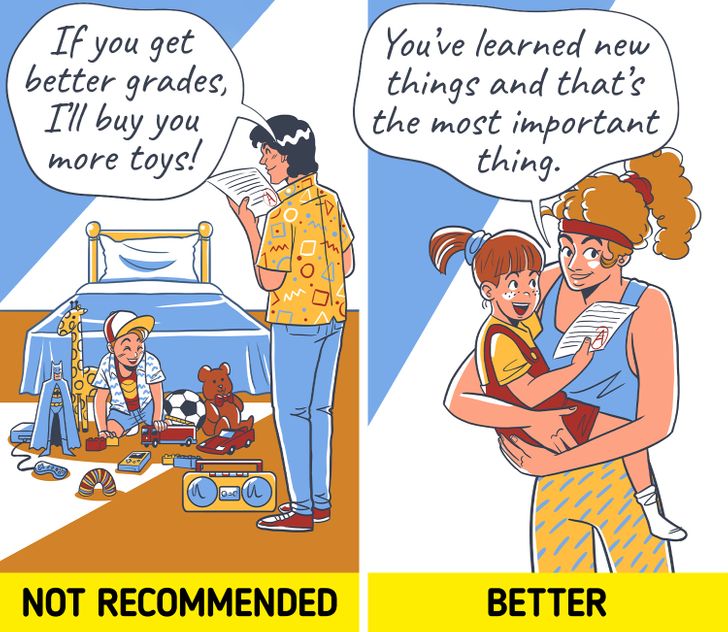
Positive education emphasizes positive emotions. This means that it focuses on practical character traits as well as personalized motivation to promote learning. So looking only at the “accolades” that come from achieving something good is not the best thing to do. Instead, positive education is intended to show the child that the love you have for them is unconditional.
Therefore, showing one’s feelings and letting the child express their own is a healthy demonstration of affection. Phrases, such as “I’m so happy with what you’ve accomplished,” or “It’s great that you managed,” are more motivating than material rewards. This is truly positive reinforcement, according to Dr. Angela Nakab.
Benefits of education without punishment or rewards
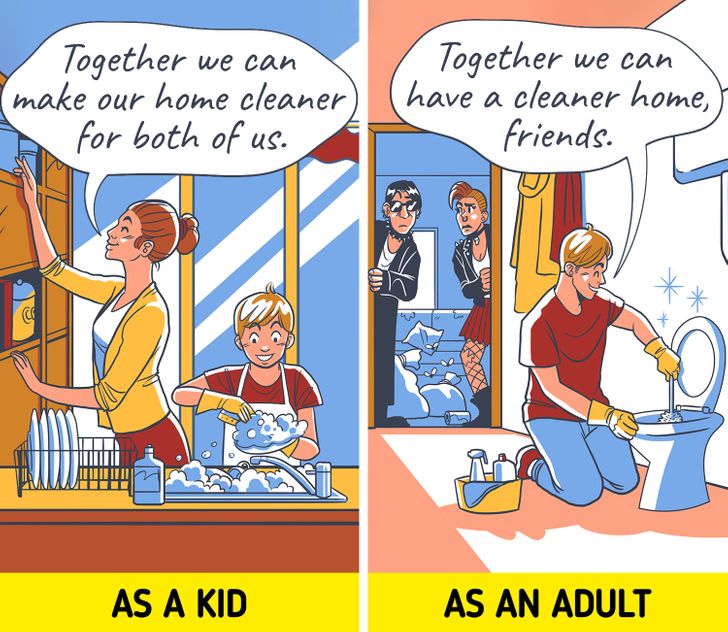
According to the 5 pillars of positive education, children who are not punished or rewarded for their behavior have greater benefits:
- They learn faster because, through positiveness, what the child is thinking, feeling, and deciding about themselves or their world is taken into account as well.
- Children develop greater confidence, which provides them with a healthier sense of self-esteem.
- There is more satisfaction and excitement about promoting good deeds.
- A sense of cooperation is reinforced.
- Basic and fundamental social skills for life are developed.
- Parents can feel better about their parenting.
How the parent-child relationship improves
For parents, it’s better to establish rules that lead to a deeper reflection of why things are done a certain way rather than simply punish their children for not obeying them. This means that instead of saying, “If you don’t do your homework, you won’t play video games tonight,” it’s better to show children why studying is an opportunity to learn new helpful things. Therefore, the advice for parents is not to generate affective dependencies, neither negative nor positive, toward children’s behaviors.
Adults can use alternatives to rewards and punishment, as long as they give value to one action without having to demerit another.
What other way of educating children, without using punishment, do you think is effective? What has worked in your experience?
Comments
I believe that trust is the key element in the growth of chidlren
Related Reads
22 Things That Should Be Used Worldwide to Make Our Lives Easier

What the 3-Second Rule Is That Korean Women Swear by and How It Can Transform Your Skin

8 Rules Prince William and Kate Middleton Need to Follow That Other Royals Don’t

20 Bright Examples That Show a Beard Can Change a Man’s Face More Than Plastic Surgery Can

15 People Who Prove All Cool Things Happen Accidentally

10 Principles That Can Cause a Person to Remain Poor for the Rest of Their Life

My Fiancé’s Unpredictable Behavior Turned Our Family Meeting Upside Down

15+ True Betrayal Stories That Expose the Dark Side of People

10+ True Stories With More Crazy Twists Than a Hollywood Thriller

"Is the Painter a Friend of Meghan’s?" People Are Outraged by Kate Middleton’s "Horrific" Portrait

I Refused to Pay for a Gift After Being Invited to an All-Expenses-Paid Trip

12 People Whose Life Has More Twists Than a Telenovela

